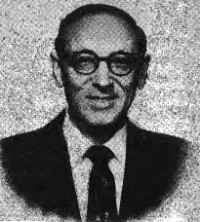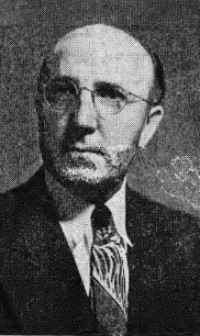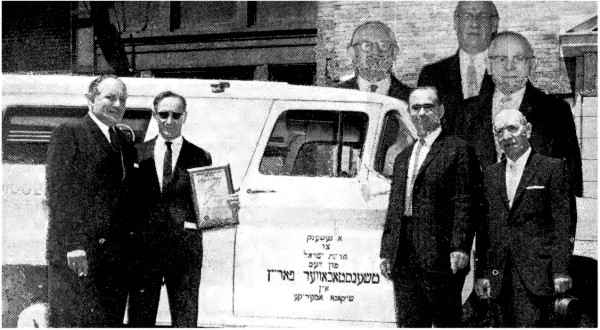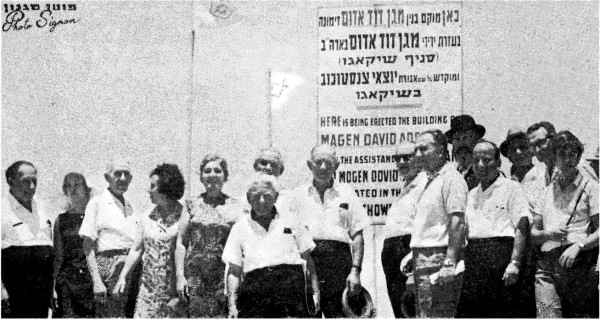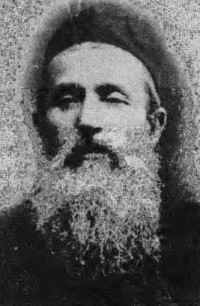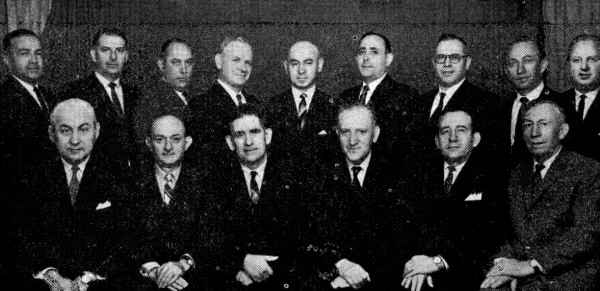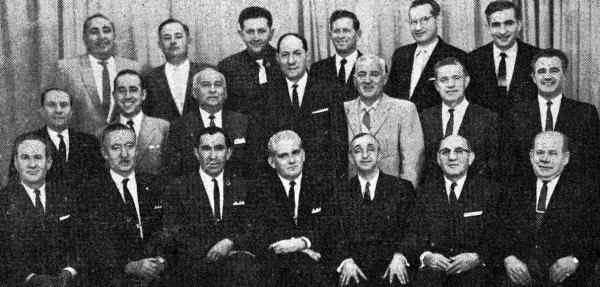[Pages 479-480]
Częstochower Society in Los Angeles
Harry Grauman
In 1944, a group of [our] compatriots in Los Angeles founded the “Czenstochover and Vicinity Aid Society”.
Over the course of the years, the Society in Los Angeles racked up many significant achievements.
Following the liberation of Częstochowa, we put ourselves in contact with the local Jewish Committee there and took upon ourselves the obligation to proffer the fullest aid.
|
|
The committee of Częstochowers in Los Angeles
Standing from left to right: M. Precel, Sz. Hofer, Szlingbaum, P. [or F.] Koziński, L. Koziński, B. Grosberg, Pozner, M. Nizinski, Sz. Zenter, H. Goldfarb, R.L. Berman
Sitting from left to right: J. Hofer, Sz. Szlingbaum, H. Grauman, M. Grosberg, Pozner, M. Zenter, A. Liberman |
A little later, we concentrated our aid towards local [viz. California] institutions in need, such as:
- “City of Hope,” which conducts widespread work to aid people who suffer from various illnesses, in their world–famous sanatorium in Duarte, next to Los Angeles;
- “Mount Sinai Hospital” where poor folk receive free medical care;
- the “[California] Home for the Aged”, in Reseda, next to Los Angeles;
- [and] the “United Jewish Welfare Fund,” which assists local institutions in need.
From time to time, we also send aid to our sister organisations in Israel and Paris.
Every year, in the month of October, we hold a memorial service in commemoration of our annihilated Częstochowa martyrs.
[Page 481]
Majer (Max) Fefer
Abram Gotlib
He was one of the first founders of the Częstochower aid society in Detroit in 1923[1].
After moving to Los Angeles, he was also active in communal affairs there.
After some time, he was elected the first Chairman of the Częstochower aid society in Los Angeles.
Mr Max Fefer is a brother–in–law of Mr Max Grosberg.
Translator's footnote:
- See below, col.487, regarding this society. Return
[Page 482]
Henry Grauman, Los Angeles
Abram Gotlib
Harry Grauman was born in Częstochowa in 1898 to impoverished parents. His father was a cobbler, who barely managed to sustain his large family.
Seeing as the family numbered seven persons and the need was great, he was already forced, from his earliest years, to begin working. At the age of ten, he began work at Konarski's toy factory and, at twelve, he went to a tailor as apprentice.
During the First World War Grauman voluntarily joined the German Army, where he laboured digging trenches. After a certain time, together with other Jewish workers, he travelled to Germany and worked there in the coal mines.
In 1923, Grauman arrived in New York and immediately joined the United Czenstochover Relief Committee. After a couple of years, Grauman settled in Los Angeles where, in 1944, he helped found the local Czenstochover and Vicinity Aid Society. He was chosen as the Society's secretary, a position which he holds to this day and to which he dedicates a great deal of time, effort and sacrifice.
[Pages 483-484]
Częstochowa and Chicago
Mojsze Krauze
The Czenstochover Society of Chicago was established in 1927. Its founders were Abram Sz. Miska, Morris Solomon (died in April 1965), Szulim (Sol) Baum, Harry Dukart and Georg Fiszer.
We should also mention the names of the loyal friends who dedicated all their free time to the Czenstochover Society, but were sadly unable to see the fruits of their labour, as they were torn away from us prematurely. These were Howard Feigin (in Częstochowa – Fajgenblat), Frank Auslander (he was not a Częstochower himself, but the husband of a young lady from Częstochowa of the surname Gross) and Harry Wozowski. Honoured be their memory!
|
|
The ceremony of the presentation of the ambulance [to Magen David Adom][1]
Standing from left to right: Milton Lambert, President of the Chicago Magen David Adom division; Albert Kozlow, Director of Magen David Adom in New York;
Mojsze Krauze, President of the Czenstochover Society of Chicago; Martin Fuks, member of the Czenstochover Society of Chicago Executive |
In 1940 a split occurred in the organisation and some of the members established a second society, under the name of the “Independent Czenstochover Society”. One of the new society's leaders was Mojsze Ceszynski (a contributor to the Częstochower Zeitung before travelling to America). In this manner, to this day, there have remained two Częstochower associations in Chicago.
Following the Second World War, Częstochowa landsleit began arriving in Chicago, the majority of whom joined the Czenstochover Society.
In 1952, a monument was erected, in the cemetery, which was dedicated to all Częstochowers who were killed by the Nazi murderers.
In June 1963, a special ceremony was held, in New York, celebrating the donation of an ambulance, by the Czenstochover Society of Chicago, to Magen David Adom in Israel.
The Częstochower association in Chicago supports [our] needy landsleit who live in Israel, Poland and in other countries. At the same time, we also support various Jewish institutions which turn to us for aid.
|
|
Laying the foundation stone for the Magen David Adom building in Dimona [Southern Israel] which was donated by the Częstochowers of Chicago in 1968
In the photograph: Mr Lampert and his wife, from Chicago; the Rabbi of Dimona Delegation of Częstochowers from Tel–Aviv: Mmes Grinberg [and] Diamant;
Mbrs Efraim, Erlich, Ben–Moshe, Gotlib, Horowicz, Tiberg, Jakobi, Kineret, Szymonowicz |
Translator's footnote:
- Text on ambulance door (in Yiddish): “A Gift to the State of Israel from the Czenstochover Society of Chicago.” Return
[Pages 485-486]
Mojsze Ceszyński z”l
Mojsze Krauze
Already, from his earliest years – thanks to his father's influence – he was taken with the ideals of Zionism. The Dreyfus trial and the pogroms on Jews in Russia and Poland made a great impression on him.
In 1904, Mojsze Ceszyński joined the Poalei Zion Party and took part in all the struggles and perils of the contemporary Revolutionary Movement.
In 1913, he participated, as a delegate from Częstochowa, in the World Poalei–Zion Conference in Kraków.
In 1914, together with the management of the Bakery–Workers' Professional Union, he was arrested for his public appearance at one of their meetings and, for several months, he sat in prison.
From 1912 onwards, Mojsze Ceszyński became one of the first pioneers and most important contributors to the Jewish press in Częstochowa and worked on the Częstochower Reklamen–Blatt, Wochenblatt [Weekly Paper] and Tageblatt.
In 1914, on the eve of the First World War, Mojsze Ceszyński left for America.
In 1931 he became a publisher and editor of Jewish books.
In Chicago, Mojsze Ceszyński was one of the first members of YIVO. He was in contact with YIVO in Wilna [and] sent it books and material support. He was active in the Chicago Cultural Society[1]. He aided Jewish schools [and] was the founder of the Independent Czenstochover Society.
He was active in the relief work for Częstochowa and was an executive member of the landsleit organisations for the Working Land of Israel.
Mojsze Ceszynski's soul ascended on Wednesday, 20th December 1958.
Częstochowa landsleit, as well as the Jewish cultural world, will always respectfully mention him favourably.
Translator's footnote:
- Probably refers to the United Jewish Workers' Cultural Society. Return
[Page 487]
Czenstochover Society in Detroit
Ruben Luks
Many Częstochowa landsleit concentrated around the first Czenstochover and Vicinity Society in Detroit, which was founded in March 1925. But sadly, this association was not able to become a landsleit's–organisation on a broader scale.
In March 1935, a new attempt was made and the Czenstochover Regional Union (now the Czenstochover Society) was established.
Over the course of its 32–year existence, the Czenstochover Society developed strong work in all areas and it is acknowledged as an important element of Detroit's Jewish communal life.
The Czenstochover Society has, during all its years conducted systematic, cultural and informational activity. It has distributed aid to its members and, together with other Jewish institutions in Detroit, has taken part in all the national functions, above all in benefit of the State of Israel.
The current management of the Society consists of the following persons:
- Ruben Luks – President
- Joel Czudno – Vice–President
- Sam Zbara – Treasurer
- Wolf Gruka – Financial Secretary
- Jenny Fox – Recording Secretary
- Jenny Wiatrak and Isidor Gray – Managers.
The Executive Committee comprises:
Morris Cohen, Abraham Fox, Isidor Gliksman, Isidor Halberg, G.[1] Richter, Sol Chertman [and] Helen Zbara.
Translator's footnote:
- גוידבי (Guidby) in the original Yiddish; very probably a misprint. The allusion may be to Gertrude Richter, the wife of Nathan Richter from Częstochowa, who was active in this organisation. Return
[Page 488]
Kalman Grosberg
Ruben Luks
Kalman Grosberg was born in Radomsko and came to Częstochowa at the age of thirteen where, over the course of time, he became well–known to all of the city's residents.
He was a deeply religious Jew and, being honourable and a man of charity, he did everything for Jews of an impoverished standing, so that they had [provisions] for Shabbes and holidays.
He was a good [Torah scroll] reader, especially at the Radomsker shtiebel, as well as at Bikur Cholim, and the municipal study–hall.
He arrived in America in 1924 and died in 1944 in Los Angeles, California, at the age of 86.
[Pages 489-490]
The Częstochower Landsmannschaft of Montreal
Dr Benjamin Orenstein
The main activity of the Częstochower Landsmannschaft of Montreal is centred upon arranging a annual memorial service in honour of the Częstochowa martyrs who were annihilated by the Nazi murderers, immortalising the history of the Częstochowa community in various manners, sending material aid to [our] needy landsleit in different countries and maintaining constant contact with all the Częstochowa institutions in Israel, as well as in the entire Jewish World.
|
|
| The Częstochower Landsmannschaft of Montreal |
The Society also conducts intensive activity to present materials and testimonies in the trials against the Nazi murderers who are guilty of destroying Częstochowa Jewry.
Representing the once colourful Jewish community of Częstochowa, the Landsmannschaft of Montreal has gained a respected position in the city's social and cultural life.
[Pages 491-494]
The Częstochower Landsmannschaft of Toronto
Mojsze Frank
The aid society of the Częstochowers in Toronto was established in 1943. The following members were voted to the [committee of] management: Mojsze Tarnowsky z”l – Chairman, Sz. Kaminowski Minutes Secretary, Szymszon Lichter – Financial Secretary and David Bernholtz – Treasurer.
The Executive Board comprised: Tz. Orzech, Goldberg, David Bernholtz, M. Pinkus, Woznica, Dolman, Landau, Elster and others.
|
|
| Częstochower Committee in Toronto (Canada) |
A women's committee was also created, which performed an important share of the work of the aid society in Toronto and it excelled in raising large sums of money.
Immediately after the Second World War ended, the society sent shipments of clothing, medication and foodstuffs for the surviving landsleit in Częstochowa, Germany, Sweden and the Land of Israel.
At the end of 1948, when a large number of fellow countrymen arrived in Toronto, a general meeting of all Częstochowers was held, at which it was decided to broaden the scope of the society's activity and a new management was elected, with the following line–up:
- Zysa Lapidus – Chairman;
- Josel Goldberg z”l – Vice–chairman;
- Leibisz Gliksman – Financial Secretary;
- Eli Sztajnic – Minutes Secretary (later, J. Nightingale [Nachtigal] became Minutes Secretary).
The Executive was comprised of the following: Sz. Lichert [sic Lichter], Sz. Kaminowski, D. Bernholtz, M. Pinkus, M. Dolman, M. Frank, L. Borkowski, L. Erlich, G. Bialik, M. Gliksman, Landau [and] Świętarski.
The renewed aid work not only encompassed fellow landsleit abroad, but also the Częstochowers within Toronto itself. We know who is in need of our assistance. We visit ailing landsleit and support widows and orphans.
The memorial services are conducted exclusively within a sacred enclosure, officiated by a rabbi and a cantor and all the landsleit recite the traditional Kaddish, as well as lighting candles.
We have also immortalised the memory of the Częstochowa martyrs by spending five–thousand dollars to set up a medical centre in the Hatikvah neighbourhood of Tel–Aviv. The ceremonial opening of this centre was held on 8th February 1960, with an attendance of 300 of our landsleit who live in Israel, together with our delegates Szymszon Lichter and his wife (from Toronto).
The Board of Directors and the Executive of the Czenstochover and Vicinity Aid Society of Toronto for the year 1962–1963 comprises the following:
- Jankel Nightingale – Past–President;
- Jakób Świętarski – President;
- Leo Buchwalter – Vice–President;
- Mojsze Frank – Minutes Secretary;
- Abraham Weinstock – Financial Secretary;
- Szmul Gelkopf – Treasurer.
The Executive is comprised of: J. Jakubowicz, Szymon [sic Szymszon] Lichter, Szaje Kaminowski, D. Bernholtz, M. Pinkus, H. Zaks, A. Cohen, Z. Lapidus, G. Bialik, M. Chłopak, F. Orbach, L. Mark, M. Działoszyński, H. Federman, D. Forberg, H. Forberg, L. Borkowski, M. Altman, Sz. Waga, A. Czarny, B. Wajsberg, M. Rostowski, Sz. Sosze [?], Z. Gelber [and] J. Krakowski.
This material is made available by JewishGen, Inc.
and the Yizkor Book Project for the purpose of
fulfilling our
mission of disseminating information about the Holocaust and
destroyed Jewish communities.
This material may not be copied,
sold or bartered without JewishGen, Inc.'s permission. Rights may be
reserved by the copyright holder.
JewishGen, Inc. makes no representations regarding the accuracy of
the translation. The reader may wish to refer to the original material
for verification.
JewishGen is not responsible for inaccuracies or omissions in the original work and cannot rewrite or edit the text to correct inaccuracies and/or omissions.
Our mission is to produce a translation of the original work and we cannot verify the accuracy of statements or alter facts cited.
 Czestochowa, Poland
Czestochowa, Poland
 Yizkor Book Project
Yizkor Book Project
 JewishGen Home Page
JewishGen Home Page
Yizkor Book Director, Lance Ackerfeld
This web page created by Jason Hallgarten
Copyright © 1999-2025 by JewishGen, Inc.
Updated 25 Jun 2020 by JH

